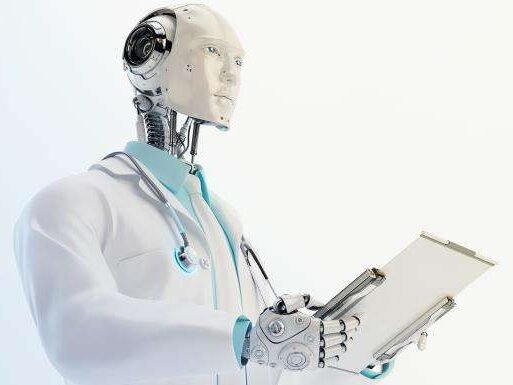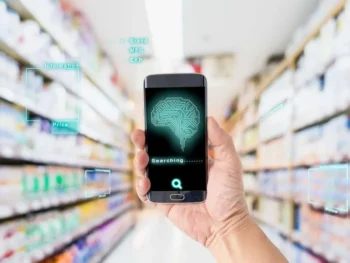A few days ago I came across an article titled Doctors, beware: A ‘robot doctor’ just matched humans’ diagnostic performance. It talked about the giant strides AI has been making in the field of medicine.
Most chatter around AI and medicine appears to be controversial. Some people argue that AI may replace doctors in the future, but it doesn’t look like that’s going to happen. AI will, however, help doctors.
In order to understand the role of AI in medicine, it is important to comprehend what AI is. It is defined as the capability of a machine to imitate human behavior.
While AI is already being used in medicine, we must mention that it’s a complementary technology. It is made to enhance what doctors do. In addition to surgeons and physicians, it is also helping researchers find cures and treat patients.
However, the growth of AI in medicine isn’t as quick as the growth of AI in other industries. People are not very open to the idea of machines treating them. There’s a lack of faith. But, AI is there as seen in the successful adoption of electronic healthcare records.
Researchers are working on creating algorithms and machines to help doctors diagnose and treat patients. These technologies do not only help doctors but patients as well. It reduces the time and cost required to perform a procedure. As a result, patients enjoy a better experience.
How AI Is Being Used in Medicine
Here are some applications of AI technology in medicine:
– Diagnose Diseases
One needs years of medical training to be able to diagnose diseases correctly. Even there, there’s always a risk of mistakes or errors during the process. Plus, late diagnosis can lead to major problems. This is why deep machine learning is being used to make a diagnosis. Machine algorithms are able to see patterns just like doctors or surgeons see them.
Machines need thousands of clear and concrete examples in order to study a pattern. Machines cannot read textbooks. They need digitized information, which can be a bit difficult to produce but experts have made giant strides in this field.
A few things machines can do include:
- Detect strokes or lung cancers based on tests such as CT scans
- Study skin images to classify skin lesions
- Assess the risk of heart diseases based on MRI and electrocardiograms
- Study eye images to find indicators of problems such as diabetic retinopathy
Since there’s a lot of data for machines to study, they’re said to be as reliable as humans. The difference is that machines take only a few seconds to draw a conclusion; whereas, it can take humans hours and even days in some cases. Plus, AI is able to identify even the smallest of changes in images that doctors may accidentally miss.
A recent study found that computers are already better than humans at diagnosing diseases.
We must mention that this is just the beginning. Scientists are working on creating a faster and more reliable system that will include data from multiple sources such as MRI, CT, and genomics.
– Personalize Treatment
One size fits all approach is not always suitable for patients since our bodies respond differently to different treatment options. Hence, personalization is important in this field.
However, it can be very difficult to know what factors can have an influence on a patient. Machine learning can help by discovering the characteristics that indicate the type of response a patient will have when given a specific type of treatment. The system cross-references similar patients and compares their outcomes to learn the algorithm.
This information can help doctors design a personalized treatment plan for patients.
– Improved Production of Drugs
Medical technology has grown by leaps and bounds but some diseases are still not curable. Plus, many drugs are ineffective or too expensive, hence scientists are working to find more affordable and reliable solutions. Artificial intelligence can speed up the process and aid researchers in the development of medical drugs.
Drug development is a very complex process. It involves several steps including:
- The identification of target molecules
- The discovery of effective drugs
- The handling of clinical trials
- The process of finding biomarkers for diagnostics
AI is already being used in all four stages. AI can analyze available data and understand the origin of a disease to reach its potential resistance mechanism. However, the current software is not fully reliable and results in several false positives.
Many experts credit AI for the huge success of telemedicine. The industry is expected to be worth 148.32 billion by 2025. It’s believed that doctors who utilize artificial intelligence will ‘win out’ over experts who do not. Since AI is making things safer and more affordable, we can bet that it’s here to stay.
– Better Gene Editing
This is one of the developing fields of medical science but very few people know about it. Clustered Regularly Interspaced Short Palindromic Repeats has revolutionized the world as it allows surgeons to edit DNA in a quick and affordable manner.
Playing with DNA can be tricky, especially because one has to carefully select the DNA location to edit. Since there are multiple options and most of them appear identical, it can be difficult to pick the right one.
Machine learning algorithms have been proven to be reliable when it comes to finding the right location. It’s hoped that this technology will help us learn more about DNA.



